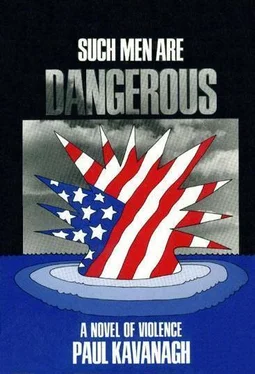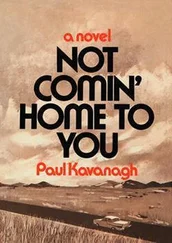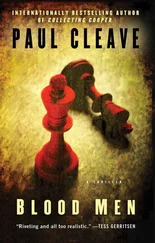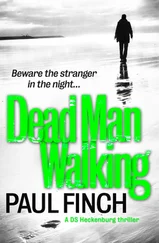I separated the grenade and the launcher. I put the grenade in the glove compartment, chucked the launcher into the back seat.
He shuddered. “You had to bring them?”
“What did you want me to do with them?”
“I know. They make me nervous.”
“We drove two thousand miles with a truck full of them, and now you’re nervous.”
“It’s different. I just spent half an hour with this one pointed at me.” He stuck a cigarette in his mouth and poked the dashboard lighter. He didn’t say anything until he had treated his lungs to a cloud of smoke. Then he started giggling.
He said, “They never planned a cross. I’d give twenty-to-one on it. That bit with the grenade, they were terrified. Literally terrified. That you might slip. Anything.”
“Just so they paid up. You couldn’t have counted it.”
“I had trouble enough lifting it. I gave it a quick check. All U.S., incidentally. I thought they might make up part of it in pounds, but it’s nothing but dollars.” He fell silent. He wasn’t driving anywhere in particular, but he was making a lot of turns and keeping an eye on the mirror.
All at once he giggled again. “You missed a show,” he said. “The boss man damn near had a stroke. ‘What if your friend slips? What if zere iss an ox-see-dent?’ To tell you the truth, the same thought occurred to me. That thing had me a little shaky.”
“No need. I never engaged the pin.”
He turned his head all the way around to look at me. “Truth?”
“Truth. I didn’t want an ox-see-dent either.”
“You could have told me.”
“I figured you’d be more convincing this way. Sell the salesman, then let the salesman sell the product.”
He thought about it. “I won’t argue, friend Paul. As long as my hair isn’t suddenly gray. Is it?”
“No.”
“Then all is forgiven.”
He got very jovial a few minutes later. I put myself into the mood and threw an arm over his shoulder. He started singing something. A college song, I think.
I moved my hand to the back of his neck. He stopped for a red light, and I used my thumb and forefinger on the big blood vessels on either side of his neck.
When the light changed, I was driving. He was on the passenger side, sound asleep.
I was standing a few feet behind him when he came to. I had removed the gag once I had the boat a good ways out on the water, but I heard him fighting the ropes before he actually said anything. This went on for a few minutes, and I stopped what I was doing and watched. I had him on his back, wedged between the deck chair and the rail so he wouldn’t roll around. His hands were tied behind his back with electrical wire. I had the same kind of wire wound around his legs in three places, and there was a heavy rope around his ankles.
He did all the squirming he could and proved that he wasn’t going to accomplish anything that way. Then he stopped, and then he spoke in a whisper.
“Paul? Paul? Where are you, Paul?”
I said, “Here.”
“I don’t know how the hell they did it. Was it the Greek? The last thing I remember was driving, then nothing. We’re on some kind of a boat. Not the Pindaris. Where are we?”
“The Atlantic. About four miles from land. International waters.”
“Jesus, how did we—” He stopped short. “Paul?” I walked around the deck chair on the port side. He didn’t say anything, and I watched his face as it all sank in. He got it a little at a time and his face kept on changing and he still didn’t say a word.
“I rented the boat less than a mile down the waterfront from where we delivered the load. Did I say rented? I mean chartered. I chartered the ship. It’s a cabin cruiser, sleeps four. A good-sized engine, but it’s off now. We’re drifting. Adrift in the Atlantic. I like the sound of that, don’t you? Adrift in the Atlantic.”
“I don’t believe it.”
“You will,” I said. “There’s loads of time. It’s two o’clock, the Pindaris sailed an hour ago. I saw her leave. She’s out of sight now. Pretty soon the sun will be over the yardarm. We don’t have a yardarm, George. It’s a nautical term. I don’t know what it means.”
“Is this a gag?”
“Guess.”
“It might be your idea of a joke. We worked everything out, I made a mistake, a lot of mistakes, we worked everything out—”
“Uh-huh.”
“It’s not a joke,” he said.
“No.”
“You are going to kill me.”
“Yes.”
“For Christ’s sake, why?” His voice was hoarse. “I’ll never try to job you again, you must know that. Do you want the money? I can’t believe it, but if you want it you can take it. Screw the money, I don’t care about the money.” A pause. “No, damn it, that’s not it. I just don’t believe it. That’s not it, is it, Paul?”
“The money? No.”
“Then—”
“I killed nineteen men for a million dollars. That’s a little over fifty thousand dollars a man. If I killed you for another million I’d be cheapening their lives. It doesn’t seem right.”
He stared at me. “Oh, no. The one thing I never figured—”
“I got my million. Fair is fair. The other million is yours, George. I wouldn’t take it away from you.”
“You snapped. You went over the edge. I never figured. Paul, Paul—”
I dragged over one of the metal cases. I flipped the hinges, lifted the lid. It was packed with fifty-dollar bills in stacks of a hundred.
“See? A million dollars.” I closed the box. “I don’t want it. Watch closely now, this is something you’ve never seen before. Watch.”
I threw the box over the side.
“I don’t believe it.”
I felt like singing. I knew I was smiling like an idiot but I couldn’t help it. “What’s so hard to believe? There’s too much money in the world. Ordinarily I wouldn’t throw it in the ocean because the fish can’t eat it. I only throw organic refuse in the ocean. Sometimes, though, a man has to bend so he won’t break. Sometimes he can do both. A question of compromise. The fish can’t eat a grenade launcher—” I threw the launcher over the side — “or a grenade” —I flipped the grenade after it — “or the wires on your wrists, or the rope around your ankles, or the anchor at the end of the rope. If you lift your head you’ll see the anchor. That’s why we’re adrift in the Atlantic, George, not just for the beauty of the phrase, the poetry of the words, but because the anchor is here in the boat and you’re attached to it. Are you getting attached to your anchor, George? The fish won’t eat it, or your clothes, but they’ll eat you, George!”
I started laughing and couldn’t get hold of it. I grabbed onto the rail and clenched my teeth and shut my eyes and took deep breaths, in out in out. I knew what was happening. A corner of my mind knew exactly what was happening, and I kept my eyes shut and my jaws locked together and kept taking deep breaths until the rough parts smoothed out again.
He was saying the same thing, over and over, as if the words had magical properties. “You’re crazy. You’re out of your mind, you’re crazy—”
I stood and watched him. I was calm now, and so of course he started to tell me that I had to calm down. “I think I’ll go below,” I told him. “That’s another nautical term. It means downstairs. Try to get some rest, George.”
I went downstairs and sat on a bed and wondered what they called beds on a ship. It wasn’t going well, I told myself. I couldn’t get organized, I kept going off on tangents and winding up hysterical. I had to straighten myself out. One thing at a time, one damned thing at a time.
I thought it all out and had it fixed in my mind when I went upstairs again. He was lying still, and for a moment I thought he was dead, but then his eyes turned to focus on me. He didn’t say anything.
Читать дальше











![Paul Finch - A Wanted Man [A PC Heckenburg Short Story]](/books/702381/paul-finch-a-wanted-man-a-pc-heckenburg-short-sto-thumb.webp)
